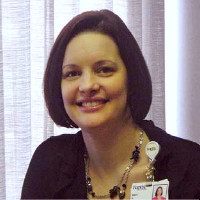Mississippi Baptist Hospital Addresses The Quality Of All Relationships Resulting In Significant Cost Savings And Improved Scores
Mississippi Baptist Medical Center is a 638‐licensed bed community hospital located in Jackson, Mississippi. When Mississippi Baptist began consulting with Creative Health Care Management, their goals were clear: they wanted to improve patient satisfaction and employee engagement. All they needed was a skillful partner committed to helping them learn how to bring their vision fully to life within their organization and to sustain all of their improvements indefinitely. Coming up on the three‐year mark of implementation, Mississippi Baptist has an inspiring story to tell.
Issues
- Baseline data showed patient satisfaction was below CMS average.
- Employee satisfaction and nursing satisfaction were low.
- Nurse turnover was high.
Solution
"The goal was to see improvement in every measure, but we were committed to doing it with a staff‐driven model.”
Bobbie Ware, VP Patient Care Services and CNO
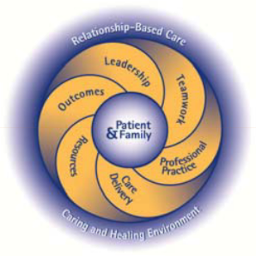
Bobbie Ware Vice President Patient Care Services and Chief Nursing Officer
Outcomes
- 5 of 9 HCAHPS Composites are in the 90th percentile ranking of CMS data base, saving an estimated $251,636.00 for Value Based Purchasing reimbursement for FY 2015.
- Employee satisfaction and nursing satisfaction have increased significantly.
- Nurse turnover dropped from 21.5% to 13.5% (or approximately 75 full‐time RNs), with a cost savings to the organization of approximately $1.64 million per year.
- Agency staffing costs dropped from $4.65M a year to $0.
- RN sign on bonuses have been eliminated; prior to RBC RN sign on bonuses ranged from $500 ‐ $10,000 per position.
- Shift bidding has been eliminated; prior to RBC shift bidding added an additional $5‐10/hour per RN for the total hours of shift coverage.
Implementing RBC helped Mississippi Baptist save over $4.6 MILLION in 1 year by increasing retention, decreasing time to fill vacancies, and eliminating agency nurses!
Where Culture is Concerned, it’s All about Fit
Relationship‐Based Care addressed Mississippi Baptist’s clear objective to include everyone in every role and department in the transformation of their culture while also aligning with their Christian healing ministry as a faith‐based organization. They’d begun an initiative previously, that had a “nurses only” focus, which inadvertently caused a lot of disconnection among the staff. One of the reasons RBC took hold after other initiatives had lost steam was that it was all ‐inclusive. The philosophy behind RBC matches the Mississippi Baptist philosophy that truly everyone is part of the patient experience—whether they physi‐ cally cross paths with patients and families or not. That’s how RBC works, and the people at Mississippi Baptist will tell you that that’s a big part of why it works so well for them.
The Importance of Highly Visible, Highly Committed Executive Level Support
In many organizations individuals at the executive level will publically state their support for an initiative, but if people don’t see it, its effect is limited. At Mis‐ sissippi Baptist there was always visible support. After several months of kick‐ off and celebration events, many leaders had already been through numerous presentations and could have just gotten things started at various meetings and then left, but this group said that it was important that they were physically there providing visible leadership. They understood the value of their visible commitment to both the implementation effort itself and to its sustainment. If they looked as though their commitment or even their enthusiasm had waned, they understood that the entire staff and the initiative itself would be adversely affected.
Right from the start, Mississippi Baptist implemented the Re‐Igniting the Spirit of Caring (RSC) workshop as part of their RBC implementation as a way to re‐inspire staff and help them reconnect with themselves and with others as a team. Executive sponsors Bobbie Ware, RN, FACHE, CNO and Kempf Poole, RN, FACHE, Vice President of Clinical and Ambulatory Services were happy to see RSC take off so quickly: “We had two facilitators trained as quickly as we could, and we started holding work‐ shops right away. We were doing them bi‐monthly at first, then monthly. The program really helped the buy‐in when the councils first went up. There is no push back. Now there are four RSC facilitators. It helps with sustainment, and it really helps with our effort to be inclusive of people in all disciplines and service areas. It’s not limited to nursing, so there is a lot of interdisciplinary teambuilding in RSC.” Ware and Poole strongly advocated for everyone on the executive team to participate in an RSC as early in the process as possible, and that was critical in helping things to move forward. Several executive team leaders went in with “What?—three days?!” There was one executive in particular who was very skeptical beforehand. After he went through the program, he was the one who put in place that lunch would always be provided at RSC trainings, and he became a great advocate.
Outcomes: A Carefully Targeted Investment Yielded a Stellar ROI
Mississippi Baptist was looking for improvements in patient satisfaction and employee satisfaction, and they were committed to investing in developing their people in order to make that happen. They got the improvements they were looking for, but something unexpected also happened. As Relationship‐Based Care took hold, costs dropped significantly. In fact, Mississippi Baptist saved enough to pay for its RBC implementation several times over. Along with the high nurse turnover costs they bore previous to their RBC implementation, Mississippi Baptist had been spending an average of $4.65 million a year on agency staffing. This was necessary because of shortages and a culture in which commitment to the team was lacking. Once Relationship‐Based Care became the culture at Mississippi Baptist, there was an intensification of the staff’s commitment not only to patients and families but also to each other, which decreased their turnover rate. Because of this decrease, they were able to do away with agency staffing completely. Bobbie Ware shared another improved outcome that correlates with reducing turnover: “We do an RN survey through NDNQI and an organization level survey once a year. Two of our surgical units improved on the measurement “job enjoyment” due to the RBC model. In June 2012, after RBC implementation went live there, one unit went from 49.8 to 58.16; another went from 52.43 to 54.61 in a one‐year period. The surgical units had only eight months of exposure to RBC when the second measure was taken in August 2012 and had already realized an increase in satisfaction.”
“It’s a steady incline,” Ware continued. “For our non‐clinical units, at an organizational level, in June of 2012, our Transportation Services department’s overall satisfaction with their job started at 64%; one year later after RBC implementation they were at 80%! Scores in our Environmental Services department were even more impressive, moving from 62% to 76% in one year; then six months after that, a ‘pulse check’ in January 2014 showed that they were at 80%. They had a really big pop initially and have just kept improving.”
Additionally, Environmental Services realized that the “Room Cleanliness” question on the patient survey was trending above CMS average for the first time ever, three months after implementing RBC. The scores have continued to improve in 2013 and 2014 (see graph on right).
Along with the increase in staff satisfaction and the decrease in turnover, Mississippi Baptist’s Hospital Consumer Assessment of Healthcare Providers and Systems (HCAHPS) scores have also been steadily increasing. In fact, nine out of nine HCAHPS indicators exceed CMS average in 2014 and five out of nine indicators exceed the 90th percentile in 2014 (see graphs on right). Mary Reedy, BSN, RN, Director of Service Excellence, stated that “without the implementation and refocus on patients and families that the RBC model and RSC provided, I feel strongly that we would not have made such great improvements in a short amount of time. Our patients telling us they have had an excellent experience at Baptist is most important to us! Also, without these improvements our organization would have lost approximately $173,570 for FY 2015 Value Based Purchasing reimbursement. Because we improved, we earned our VBP dollars back and then were rewarded for even higher scores in the amount of approximately $78,066! Both accomplishments are something we are proud of and will continue to stay focused on.”

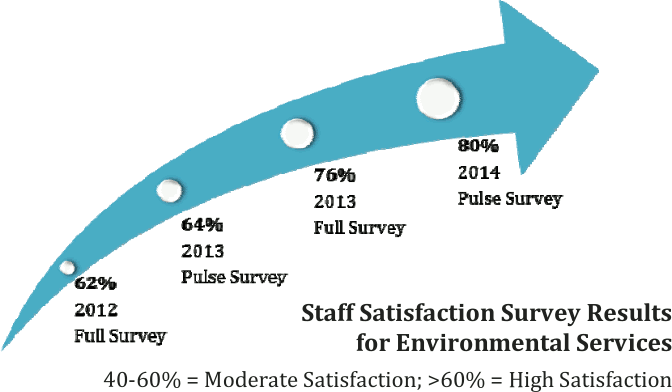
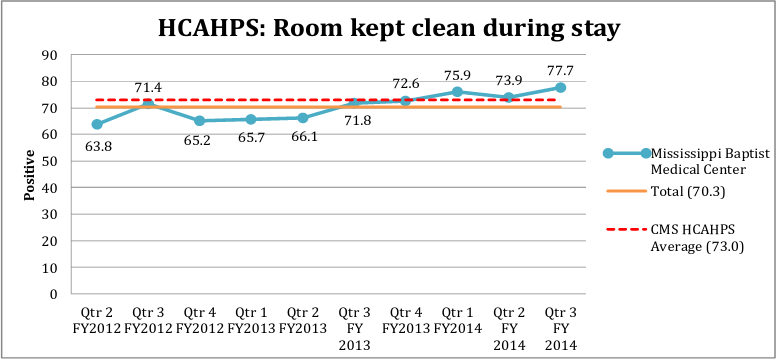
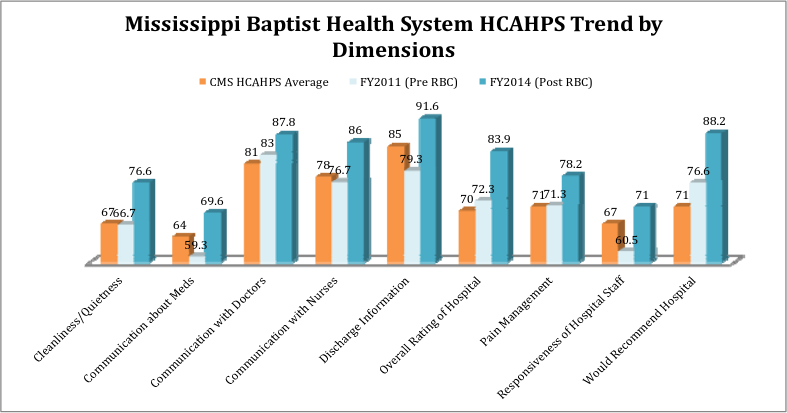
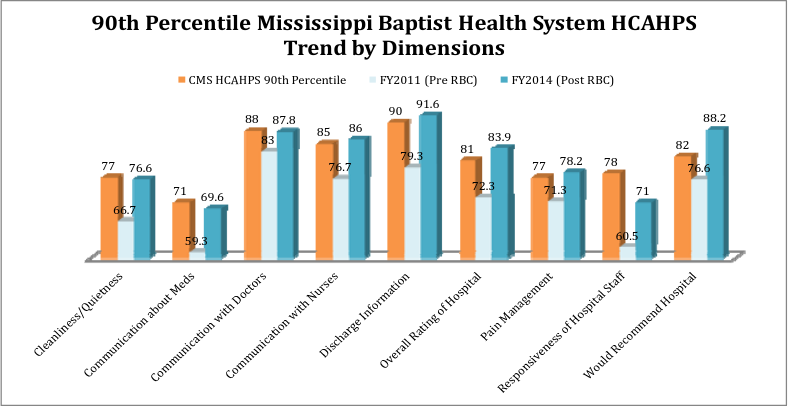
“Without the implementation and refocus on patients and families that the RBC model and RSC provided, I feel strongly that we would not have made such great improvements in a short amount of time. Our patients telling us they have had an excellent experience at Baptist is most important to us!”
Mary Reedy, BSN, RN, Director of Service Excellence
RBC Supports Magnet® Journey
Advice for Others Implementing RBC

Bobbie Ware, MHSA, BSN, RN, FACHE
Services and Chief Nursing Officer
